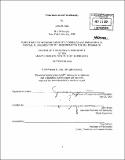| dc.contributor.advisor | Alex Byrne. | en_US |
| dc.contributor.author | John, James R., 1975- | en_US |
| dc.contributor.other | Massachusetts Institute of Technology. Dept. of Linguistics and Philosophy. | en_US |
| dc.date.accessioned | 2005-09-27T18:37:20Z | |
| dc.date.available | 2005-09-27T18:37:20Z | |
| dc.date.copyright | 2004 | en_US |
| dc.date.issued | 2004 | en_US |
| dc.identifier.uri | http://hdl.handle.net/1721.1/28838 | |
| dc.description | Thesis (Ph. D.)--Massachusetts Institute of Technology, Dept. of Linguistics and Philosophy, 2004. | en_US |
| dc.description | Includes bibliographical references (p. 174-180). | en_US |
| dc.description.abstract | (cont.) having perceptual experiences, subjects can be--and usually are--directly aware of material objects. | en_US |
| dc.description.abstract | This dissertation is about phenomenal consciousness, its relation to intentionality, and the relation of both to issues in the philosophy of perception. My principal aim is (1) to defend an account of what it is for a perceptual experience to be phenomenally conscious and (2) to develop, within the terms set forth by this account, a particular theory of perceptual phenomenal consciousness. Given the way these matters are usually understood, it probably is not obvious why I distinguish two philosophical tasks here. One might ask: "Isn't defending an account of what it is for a perceptual experience to be phenomenally conscious the same thing as developing a particular theory of perceptual phenomenal consciousness?" I argue that it is not. In addition to my principal aim, I have three subsidiary aims. First, to shed some light on what it means for a perceptual experience to be an intentional mental event, one with representational content. Many philosophers regard the notion of perceptual intentionality as utterly unproblematic. Though I accept that experiences almost always have content, I subject this claim to more scrutiny than is usual. Second, to go some way towards better understanding the relationship between perceptual phenomenal consciousness and perceptual intentionality. In particular, I examine recent attempts to explain the former in terms of the latter. My conclusion is that there can be no such explanation. Finally, to show that, by improving our understanding of perceptual phenomenal consciousness, perceptual intentionality, and the relation between them, we can make headway on some very difficult problems in the philosophy of perception. I am especially interested in defending direct realism, the view that, in | en_US |
| dc.description.statementofresponsibility | by James R. John. | en_US |
| dc.format.extent | 180 p. | en_US |
| dc.format.extent | 10858296 bytes | |
| dc.format.extent | 10881126 bytes | |
| dc.format.mimetype | application/pdf | |
| dc.format.mimetype | application/pdf | |
| dc.language.iso | en_US | |
| dc.publisher | Massachusetts Institute of Technology | en_US |
| dc.rights | M.I.T. theses are protected by copyright. They may be viewed from this source for any purpose, but reproduction or distribution in any format is prohibited without written permission. See provided URL for inquiries about permission. | en_US |
| dc.rights.uri | http://dspace.mit.edu/handle/1721.1/7582 | |
| dc.subject | Linguistics and Philosophy. | en_US |
| dc.title | Consciousness and intentionality | en_US |
| dc.type | Thesis | en_US |
| dc.description.degree | Ph.D. | en_US |
| dc.contributor.department | Massachusetts Institute of Technology. Department of Linguistics and Philosophy | |
| dc.identifier.oclc | 60385328 | en_US |
